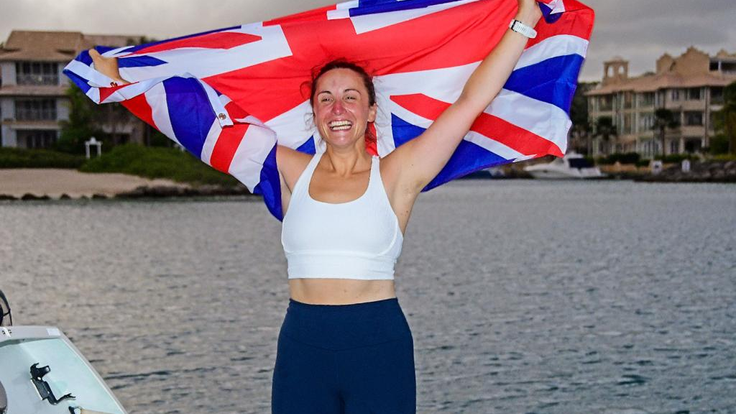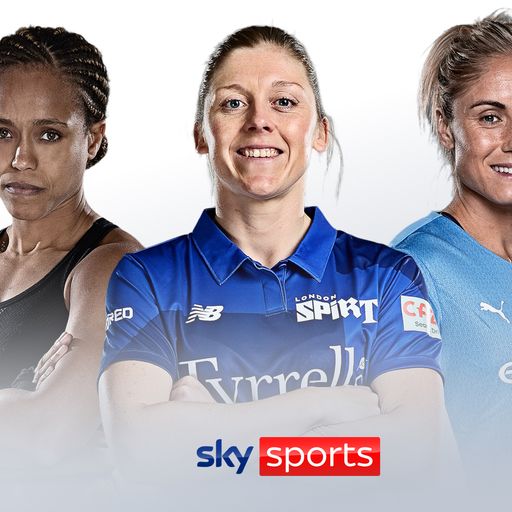Victoria Evans hopes record solo Atlantic row proves female resilience
Victoria Evans rowed 2,559 nautical miles across the Atlantic Ocean in a new world-record time of 40 days and 19 hours; "I hope I've proven on a wider scale what women are capable of. There's such a culture of manly adventure sport, but women are just as capable and just as resilient"

Tuesday 29 March 2022 15:33, UK
After setting a new record for the fastest female solo row across the Atlantic Ocean, Victoria Evans spoke to Sky Sports' Hannah Wilkes about her desire to prove what women are capable of and documented the long road to her record-breaking row.
Between February 11 and March 24, Evans wrote her name in the history books. The sports lawyer from London took to the Atlantic Ocean alone and duly beat the previous record held by a solo female rower by nine days.
Evans also beat her own stretch goal by two days too, completing the feat in 40 days and 19 hours. She even spent her 35th birthday at sea.
For 2,559 nautical miles, she did not see another person and used just her own physical power for propulsion. With unpredictable weather, potential mechanical issues and the sheer physical endurance of such a challenge, why did Evans undertake it?
"Perseverance is key," she stated first. "Anything is possible if you're willing to put in the work.
"I hope I've proven on a wider scale what women are capable of. There's such a culture of manly adventure sport, but women are just as capable and just as resilient and able to do it in a quick time.
"I'm really happy with the [record] time because I think it sets a new bar for what women are capable of. Also, I'd be so happy if another woman came along and smashed my record out the park and continued that drive.
"One of the main drivers of wanting to change women's sport and increase opportunity for women in sport is that we need to change to culture around it.
"The more examples we have of women bucking against the trend of assuming that it's not possible or that we're fragile creatures [the better]. I hope this is helpful for that and this leaves a lasting message."
Evans' build-up to the crossing and world record attempt, had been a long one.
Back in the summer of 2018, she decided that she was going to try and break the record of becoming the fastest female to row the Atlantic solo and in the process, raise money for the 'Women in Sport' charity.
At that point, it was full steam ahead. However, as her training continued and all manner of elements were being put in place, the global pandemic turned everything upside-down.
Despite training being impacted, Evans persevered to get everything together for a start date of February 2021. She'd even had managed to get the boat, which would be her only companion on her voyage, to Tenerife before Spain closed its borders and travelling became out of the question.
"It was an expensive and lengthy delay to wait, and go a year later," Evans said. "But, I was keen to not step away from the campaign as I'd already put so much into it.
"There's so much of our messaging about how we can achieve anything... you can't then just give up when times get tough."
Alongside her personal achievement, Evans' was aiming to support the charity 'Women In Sport' and achieve an overarching goal of raising awareness of what sport can do for women.
Evans, who has founded Sea Change Sport, wants to use sport to change mindsets at the heart of the sports industry and address the lack of women's involvement in sport or physical activity.
"I wasn't an active child at all, I didn't really come to sport until my mid-20s," she said. "I was at a point in life where I'd endured a reasonable amount of adversity and suffered with issues as a result.
"I had an eating disorder for a long time and depression. There's only so long you can outrun things like that. Sport has been transformational for me in overcoming those things."
Having started with running, Evans added cycling, a first triathlon and trail running into her armoury.
"I found with each of those sporting achievements, you find that you expand your definition of who you are and what you're capable of. They give you a reason to look after yourself, fuel your body properly and a sense of purpose, I guess.
"Now, I've overcome those things I really want to use that to encourage other people to benefit from what sport has to offer."
Despite these achievements, Evans did not come into this particular challenge with a background in rowing, instead she learnt to row for it.
A cross-Atlantic challenge is not only exceptionally demanding on a person's body, but it challenges the mind too. There were points during her 40 days on the water, when the nearest person to Evans was on the international space station.
"You don't leave that tiny seven by two-metre space the whole time and if you think about that logically, then it can be difficult to deal with," she said.
"When you're there, you are in your own little bubble. I never really thought about the vastness of the expanse that I was in. At the beginning, I had times where I thought something was in my peripheral vision and I was going to row into it. Nothing was there, it was just my brain trying to deal with the expansiveness.
"I did a lot of work with a coach," she continued. "We did a lot of mental preparation alongside the physical preparation.
"We prepared for the 'roommate', the voice inside your head and how you separate those thoughts from reality. You can listen to those thoughts, but you don't necessarily need to react to them.
"It was tough, there were days when I called home in tears and I had low moments, but overall I was just so focused on pushing through and had done that work in advance.
"I'd spent so long visualising being here [at the finish]," Evans concluded. "It's going to take so long to process everything that's happened."


